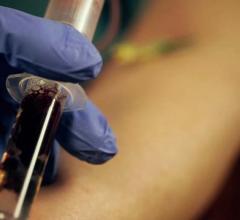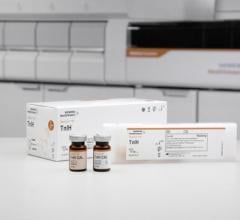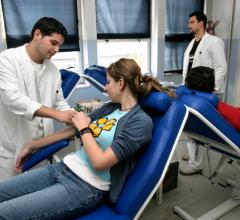
March 23, 2012 — New findings from a research study led by Scripps Translational Science Institute (STSI), a collaborative program between Scripps Health and the Scripps Research Institute (TSRI), shows a new blood test may be useful in helping doctors predict who is at risk for an imminent heart attack.
Results of the study titled, "Characterization of Circulating Endothelial Cells in Acute Myocardial Infarction," were published this week in Science Translational Medicine. The study concludes that circulating endothelial cells (CEC) from heart attack patients were abnormally large and misshapen and often appeared with multiple nuclei, which indicates that CECs are promising biomarkers for the prediction of acute ongoing arterial plaque rupture.
"The ability to diagnose an imminent heart attack has long been considered the holy grail of cardiovascular medicine," said Eric Topol, M.D., the study's principal investigator and director of STSI. "This has been a tremendous collaboration of two institutions on the research side, three health care systems in San Diego, and a life science industry leader, which has resulted in an important discovery that may help to change the future of cardiovascular medicine."
The study involved 50 patients who presented to emergency rooms with heart attacks at four acute care hospitals in San Diego. Using different cell isolation platforms, including the Veridex CellSearch System, researchers found that CEC counts and the cell structural features were dramatically altered in the heart attack population when compared to the healthy control group.
"We are pleased to have collaborated on this important investigational study,” said Mark Connelly, Ph.D., director of cellular research at Veridex. "CellSearch has proven to be a powerful tool for oncology research and the care of metastatic cancer patients. This study highlights the value of accurate rare cell capture and analysis in areas beyond oncology."
The study was co-authored by physicians and scientists from Scripps Health; STSI; TSRI; Veridex LLC; Palomar Health; and Sharp HealthCare. Funding came from a $2 million grant from the National Institutes of Health (NIH).
"With some additional validation, the hope is to have this test developed for commercial use in next year or two," said Raghava Gollapudi, M.D., principal investigator from Sharp HealthCare. "This would be an ideal test to perform in an emergency room to determine if a patient is on the cusp of a heart attack or about to experience one in the next couple of weeks. Right now we can only test to detect if a patient is currently experiencing or has recently experienced a heart attack."
For more information: www.scripps.org


 October 09, 2019
October 09, 2019 









